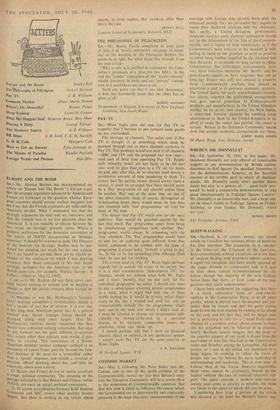Europe and the Bomb Hedley Bull The"Philosophy of Pilkington Robert
Barnard PaY' TV J. B. Williams Common Market Albert Maria Goitres Where's Mr. Donnelly? Renate Prince Sleep-Walking Lionel H. Grouse What Mr. Hoggart Said Maurice Bruce, Roy Shaw Playing it Dirty George Edinger The Shadowy Source A. P. Williams BR Blues J. B. Snell, F. E. H. Sutcliffe G. D. H. Cole Margaret Cole How to Get an Answer Pyke Johnson, Jr.
The Moons of Paradise Rosalie Packard Foreign Words and Phrases Alan Bliss EUROPE AND THE. BOMB Sta.---Mr. Alastair Buchan has misrepresented my article on 'Europe and The Bomb.' I did not argue that the strategic arguments advanced by America and France are irrelevant to the question whether Euro- pean countries should possess nuclear weapons; nor did I say that the French arguments are valid and the American invalid. What 1 contended was that the strategic arguments on each side are indecisive, and that the French case is no less plausible than the American. It is not possible to choose between the two views on strategic grounds alone. Where a Political preference for the American conception of the future of NATO masquerades as `strategic expertise,' it should be exposed as such. The Director of the Institute for Strategic Studies may be par- doned for claiming too much for his own subject. But I am bound to say that there are no clearer ex- amples of the contusion to which I was drawing attention than those contained in his own recent strategic apologies for the American view, in the British press (see, for example, 'Nuclear Europe: A Fallacy,' Observer, May 13, 1962).
I am sorry Mr. Buchan did not think more care- fully before making so serious and so baseless a charge as that the article contains three factual in- accuracies.
(1) Whether or not Mr. McNamara's 'counter- force' doctrine constitutes a revolutionary change is not a matter of fact but of opinion. It is true that It has long been American policy that in a general nuclear war, Soviet strategic forces should be attacked, along with other targets. Had Mr. McNamara's remarks merely reasserted this they Would have contained nothing remarkable. But what lie put forward was the quite different proposition that targets other than military ones would, if pos- sible, be avoided. This conception of a Soviet- American strategic nuclear exchange confined to an encounter of armed forces goes far beyond the fam- iliar doctrine of the need for a `controlled' rather than a 'spasm' response, and entails a reversal of Previous official thinking about war, and also, in- cidentally, about arms control.
(2) Britain and France do not of course constitute a single political community. The meaning of the ,„Passage referred to is that Britain and France, unlike INIATO, are each an actual political community. (3) Of course co-ordination between RAF Bomber Command and SAC covers other matters besides targets. But there is nothing in my article which
asserts, or even implies, that anything other than this is the case.
EIEDLEY BULL London School of Economics, Aldwych. WC2


































 Previous page
Previous page